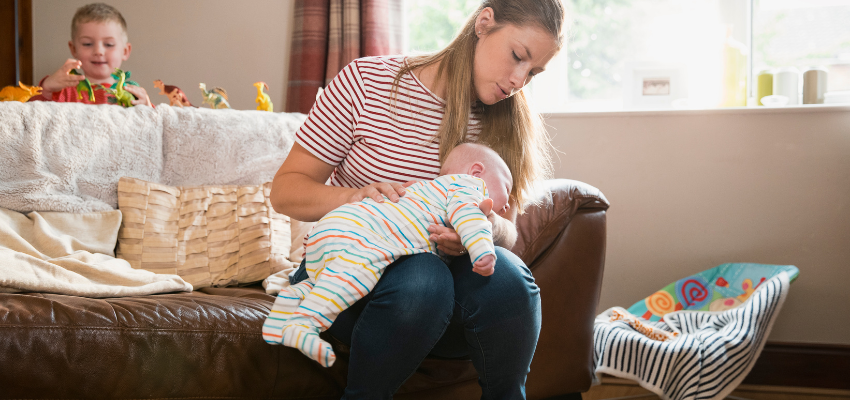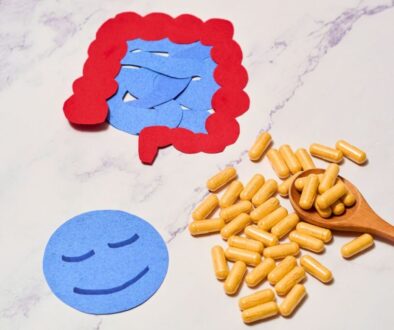Probiotics For Babies With Gas: Do They Help, And How?

Published November 14, 2022
Like most people, babies can sometimes get gassy, which is completely normal. Of course, they’re more susceptible to gassiness since they tend to swallow air while eating or crying. The symptoms usually go away on their own, and by four to six months of age, the baby will eventually grow out of it.
While gas in babies is often harmless, there are times when it can be painful for the baby. Naturally, you wouldn’t want to subject the infant to such an uncomfortable, irritating, and possibly painful experience.
Alas, most remedies to gas in infants, like moving their legs in a circle, raising their head, and swaddling, are primarily for gas relief rather than prevention. But that’s only when the baby swallows air.
If it’s for any other reason, there might be a plausible preventative measure.
What Causes Babies To Have A Lot Of Gas?
Apart from swallowing air, there are other reasons why babies or infants tend to be gassy. And most of these reasons have to do with their digestive system. An infant can get gas for the following reasons:
- Their digestive tract is immature,
- They’re suffering from minor digestive problems,
- They’re eating foods that their digestive system isn’t used to, or
- A gastrointestinal virus is causing stomach problems.
As always, the solution to a problem will generally depend on its cause. So, depending on why your baby has a lot of gas, the appropriate solution may vary. So, what does this have to do with probiotics?
What Are Probiotics?
Probiotics refer to the collection of live yeasts and bacteria in a person’s gut. There are good and bad bacteria. Probiotics are the good bacteria. They bring numerous health benefits to the body, specifically the digestive system. Lower risks of digestive problems, better lactose intolerance symptoms, and improved intestinal health are a few examples of the benefits of probiotics to the digestive system.
Due to its benefits to the digestive system, it makes sense to assume that it can help with gas since gas is often caused by digestive issues. But can probiotics really help with gas?
Do Probiotics Relieve Gas?
Yes, probiotics relieve gas, as well as bloating. But of course, it’s not for everyone.
Some might not have the tolerance for probiotics right away and may need time to adjust. Those people tend to experience gas and bloating for the first few days or weeks of consuming probiotics.
However, once their digestive system has acclimated to the supplement, the probiotics can then help alleviate gas, bloating, and other similar symptoms. This has been proven by numerous studies.
The issue here is that the constitution of an adult has numerous differences from that of an infant.
So, supplements like Bionaze that work perfectly to prevent gas and bloating in adults may not work the same way with babies, taking us to the main question, “Do probiotics help with gas in infants?”
Can Probiotics Help Gassy Babies?
Unfortunately, as much as we’d like to say it does, there’s not enough evidence to confirm the effectiveness of probiotics to gas in babies. We say not enough evidence because there are some studies that point toward that conclusion. But much like most studies, further research is needed.

That applies to even the best probiotics for newborn gas on the market. At the very least, administering probiotics to babies seems to cause no harmful effects. As such, while it’s not confirmed to be beneficial, there’s no harm in trying. After all, some parents do say their babies have become less gassy after the administration of probiotics. But if that didn’t work, there are a number of alternatives you can try.
4 Alternatives To Probiotics For Babies With Gas
Other than providing probiotics for infants gas, there are specific strategies you can use to minimize the likelihood of your baby getting gas. They won’t always work, but at least one of them should.
1. Change Your Diet
Though researchers have yet to prove it, there’s a hypothesis that what the mom eats can make its way to the baby through breastfeeding. If the mom eats certain foods that the baby is not used to, like if they’re sensitive or allergic to them, then the food will likely cause gas. There are also foods that have a higher likelihood of causing gas regardless of the baby’s food sensitivity or allergy. Here are some examples:
- Aromatic vegetables (e.g., garlic, onions, etc.)
- Cruciferous vegetables (e.g., broccoli, brussels sprouts, leafy greens, etc.)
- Dairy
- Spicy foods (e.g., curries, chilies, etc.)
If you eat these regularly, try to change your diet. Again, this isn’t proven, but there’s no harm in trying.
2. Let The Feeding Bottle Settle
It’s a common practice to shake the baby bottle thoroughly after putting the powdered formula to ensure the powder has dissolved completely. And oftentimes, such a habit can result in a bottle full of air bubbles.

Since you don’t want your baby to swallow air, as it’s one of the main reasons why they get gas, it’s best to let the bottle settle for a few minutes, or at least until there are no longer air bubbles.
3. Try Out Different Formulas
Gas is a common issue for parents with their babies, which is why there’s a market for formulas that are designed to minimize the likelihood of causing gas. You can either look for those specific formulas or try a different one every few days or weeks to see what works best for your little one.
4. Buy High-Quality Baby Bottles
Just like how there are formulas for minimizing gas, there are also manufacturers that make baby bottles with the same goal. They achieve that goal by creating a baby bottle design that reduces the amount of air that’s swallowed by the baby during feedings while using the bottle. Again, you can make use of this strategy by either buying bottles that are advertised for minimizing gas or trying out different bottles.
Ideally, you’d want to utilize these strategies as soon as you determine that your baby has gas. But for that, you must be aware of the symptoms of gassiness in infants.
How Do I Know If My Baby Has Gas?
Gas is normal among babies, and their farts or burps are usually silent. Hence, it’s not unusual to find yourself unaware that your baby has gas. The good news is there are signs of gas in infants, such as:
- Your baby is fussy. Babies are usually relatively tame, so if they’re fussy, you know there’s something up. Among the many reasons why a baby may get fussy, one is that they have gas.
- Your baby isn’t sleeping or eating well. Having gas can be uncomfortable for anyone, not just infants. While this can be a sign of other problems, it’s best to check if your baby has gas.
- Your baby is squirming too much. Squirming is normal for babies, but if it’s getting a bit too much, there’s a chance they’re extra uncomfortable due to gas.
If you notice that these signs are particularly severe in your baby, consider calling a doctor. Apart from that, there are other reasons why parents should call a doctor for their baby.
When To Call Your Doctor
While some may argue that gas is not an urgent problem, it can be under certain circumstances. In those cases, the best course of action would be to call a doctor. Here are the signs that gas in your baby is more severe than you’d initially think:
- Your baby is no longer gaining weight as soon as they show signs of frequent gas
- Your baby no longer eats as often as they did before
- Your baby is struggling to burp or fart
Benefit From The Latest Advancements In Probiotic Science With Bionaze
Bionaze is a proprietary blend of probiotics proven to promote ear, nose, and throat health, improve digestion, and support your immune system. The active ingredients BLIS K12, and BL-04 are considered among the best probiotics according to science.
Get 25% Off Your First Order when you use BIO25 at checkout!

This Content Has Been Reviewed For Factual Accuracy
This content has undergone thorough fact-checking by our team of internal experts. Learn more about the meticulous editorial standard for our website here.
ADVERTISEMENT

About The Author
Lenard Arceo is an experienced writer who enjoys learning to code in his spare time. He has a fascination with health and nutrition and enjoys sharing his knowledge and research. He is proud of his commitment to communicating factual content that has helped his readers with life changing choices over the years.




